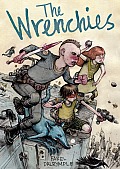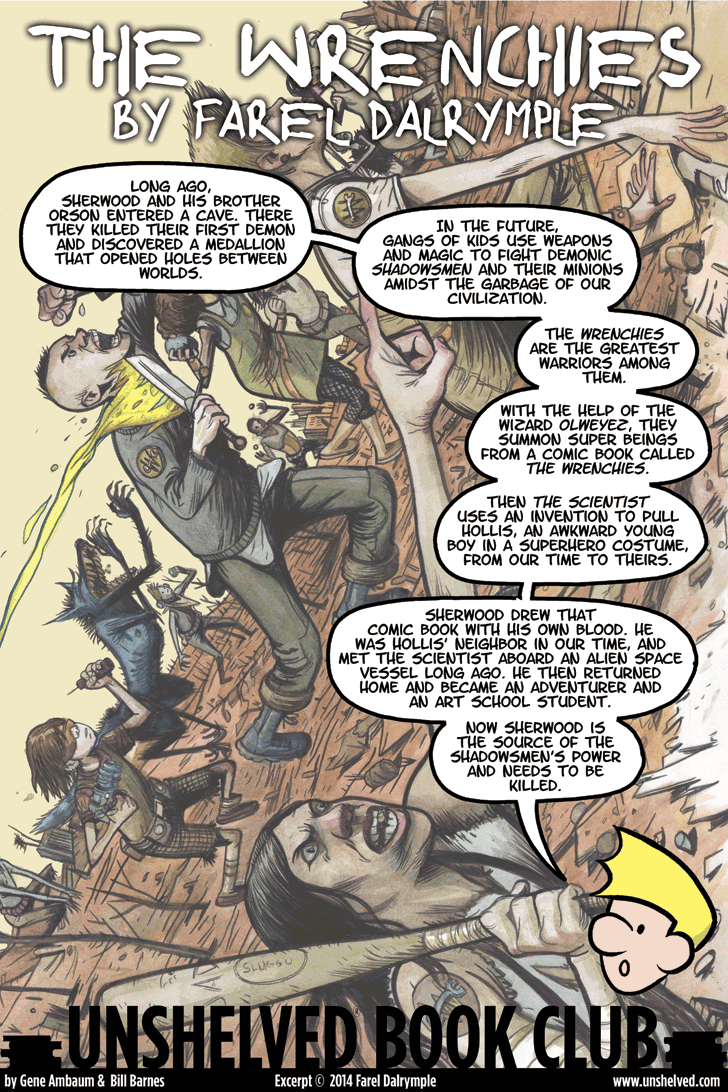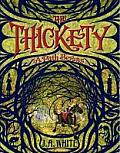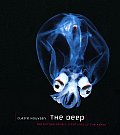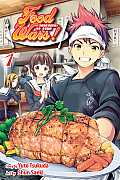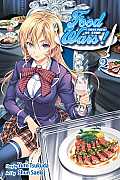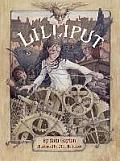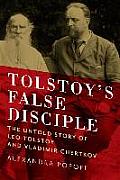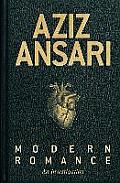Link to this review in the form of a comic strip by geneambaum tagged fantasy • coming of age • graphic novel • science fiction
Link to this review by geneambaum tagged fantasy • chapter book • coming of age
Kara was five on the night her mother was hanged for being a witch, the same night her little brother Taff was born. She vows to protect him.
Ten years later. Kara’s father is a shell of the man he once was, and she spends most of her time caring for him and her brother. She is bullied and mistreated by some, and everyone else in town eyes her with suspicion because of her mother. Then her powers begin to manifest. She retrieves her mother’s grimoire from the Thickety, the (usually) impenetrable forest that takes up most of the space on the island where she lives. Soon she’s facing accusation and execution from her community.
Why I picked it up: There’s a good buzz about the sequel, but I wanted to read this first.
Why I finished it: The opening chapter is harrowing (yes, even for an adult like me). After Kara’s mother is killed, the community’s leader, Fen’de Stone, tests Kara to see if she’s a witch. To do this another man leads a strange creature up to her. It’s a nightseeker — it starts out looking like a jet-black dog with loose skin, but unfolds and fills out before her eyes to become much bigger. Then a needle emerges from its front paw. The creature knocks her down and gazes into her eyes, piercing her arm with its appendage before snorting the blood from the needle. It’s clear that if it thinks she’s a witch, it will plunge the needle into her eye. The crowd goes wild in anticipation.
Readalikes: It’s like some weird combo of “The Scarlet Letter” (because of the Puritanical and technology-less aspects of island life) and Plain Kate, an adventure that’s also about a girl trying to hide her talents and powers from those who think she’s a witch.
Link to this review by emilyjones tagged coffee table book • science
Over two hundred stunning photographs of the remarkable species that live miles beneath the ocean’s surface are paired with scientific essays and quotes about their abundance.
Why I picked it up: Tentacles! I can’t get enough of them lately, and a friend gave me this book to feed my obsession.
Why I finished it: The ping-pong tree sponge (resembles an awesomely space age (yet retro) bulbous chandelier), the vampire squid (reminiscent of a badminton shuttlecock, only red and the arms are studded with spines), the yeti crab (it has front legs like feather boas), and the Gorgon’s head (imagine a brittle star fish with tentacles).
It’s perfect for: Jennifer, a childhood friend who will delight in sharing the gorgeous (and often creepy) pictures with her children. She loves whales, too, so I know she’ll enjoy the essay, “A Whale’s End is the Beginning of Life at the Deep Seafloor,” which shows how a whale’s carcass supports different ecosystems over the decades it decays. It’s fascinating and beautiful.
Link to this review by geneambaum tagged graphic novel • coming of age
Soma Yukihira (15) is about to graduate junior high. He’s been cooking at his family restaurant with his father for years, and his one hope is to outcook his dad. He’s determined to explore all of cooking’s flavors, both hellish and delicious, in order to defeat his dad and become worthy of running their restaurant. But then his dad unexpectedly closes it.
Soma heads to Japan’s premier cooking school. There he must compete with the rich, elite students to become one of the few graduates. Head-to-head cooking battles are the only way to gain status. And, unfortunately, in qualifying for the school, he makes an enemy of Erina Nakiri, a famed taster and chef in her own right known for ruining reputations and careers.
Publisher’s Rating: Rated T+ for Older Teen
Why I picked it up: There’s a super realistic-looking pork roast (or the like) on the cover of Volume 1, which made it really pop on the manga shelf where I saw it.
Why I finished it: Soma is decidedly lowbrow. While everyone else is talking about foreign cooking techniques and using only the best ingredients, he creates unforgettable dishes with utterly common food. As he starts to win his challenges and continues to insult his “betters” at the school, there are hilarious moments. To the shock of the audience, he walks into a high-stakes competition carrying a bag of bargain eggs. His housemates in the dormitory are very strange, too, the funniest being the upperclassman who likes to cook in just an apron. But my favorite moments are when we see the characters taste food — most often reactions are nearly orgasmic, though in one instance a bowl of crappy soup makes a chef feel as if she’s “trying to enjoy a hot spring while a western lowland gorilla stared at me” and in another ravioli makes a chef feel as if he’s “being overwhelmed by a yokozuna sumo wrestler’s perfect technique.” (The drawings that go with these descriptions are awesome.)
It’s perfect for: My buddy James, whose favorite superhero is Powergirl. (Yes, for the obvious reason(s).) He’ll like the way the fan service gets a little carried away in these volumes — there are lots of overtly sexual poses, and the books are full of nearly nude ladies.
Link to this review by diane tagged coming of age • paranormal
Fifteen-year-old Pearl is lonely and distraught after her mother dies in childbirth. She misses her terribly, and bitterly resents her baby sister, Rose, who Pearl thinks resembles a rat. Although Pearl has a wonderful relationship with her stepfather, she is concerned that he will love the baby more because she is his biological child. When her mother’s ghost begins appearing to her, Pearl is comforted at first but then begins to come to terms with her mother’s death and the changes in her life.
Why I picked it up: I was looking for a book with a more emotional and heartfelt story than what I had been reading — I wanted a change of pace from mysteries and edgy teen fiction.
Why I finished it: Furniss created a character who deals realistically with grief. Despite the supernatural touches, it reads like a true-to-life story about a young girl whose life has been turned upside down. I was shocked by Pearl’s reaction to her baby sister, but as the story progressed, I became really attached to Pearl and hoped she wouldn’t disappoint me.
It’s perfect for: One of my students, Jennifer. She’s a fan of Sarah Dessen’s books — realistic, touching, and sweet (but not sappy) novels about teen girls facing challenges. (My favorite is Lock & Key, which is about a girl abandoned by her mother who learns that family isn’t about blood.)
Link to this review by craigseasholes tagged chapter book • classic
Only three inches high, little Lily is imprisoned in a cage in Jonathan Swift’s attic while he puts finishing touches on his manuscript, Gulliver’s Travels. Having brought Lily back as living proof of his journey to the land of the Lilliputians, Swift’s plans are foiled when Lily escapes and tries to find a way through 18th-century London to return home.
Why I picked it up: On the cover, the determined girl firmly grasping a sewing needle as a sabre heralded an exciting re-imagining of Gulliver’s Travels among the Lilliputians.
Why I finished it: 18th-century London proves a dark and dangerous place for tiny Lily. Her flight is complicated by an evil clockmaker and three cruel, spoiled children who use her as a marvelous playhouse doll. Lily perseveres and finds unlikely allies who help her launch a final bid for freedom.
Readalikes: Carmen Agra Deedy’s The Cheshire Cheese Cat: A Dickens of a Tale, which introduces young readers to the London of Charles Dickens as he was writing A Tale of Two Cities.
Link to this review by robert tagged nonfiction • literary • biography
Former college professor and now literary biographer Alexandra Popoff presents a case study of Vladimir Chertkov, the man who managed to insinuate himself into the literary, political, and domestic affairs of the writer Leo Tolstoy starting in 1893. Popoff uses her access to restricted Russian archives to bolster her claims that Chertkov and his family used his influence to build careers and amass fortunes that persisted long after Tolstoy’s strange death in 1910.
Why I picked it up: I’ve always been somewhat mystified by the final decades of Tolstoy’s life. What prompted a cultural icon from an aristocratic family to create a patriotic program of agrarian, religious, and spiritual revival, to renounce the riches and profits of his literary labors?
Why I finished it: This comes as near as any literary biography I’ve read to being a true crime book about a manipulative fraudster. Popoff chronicles Chertkov’s rapid transition from fan to manager of Tolstoy’s affairs. His level of domination became so complete Tolstoy even rewrote his diaries, as well as his published work, to Chertkov’s specifications.
It’s perfect for: My mother, who has a fondness for literary biographies. She’d appreciate Popoff’s skill in untangling the projects that gave Chertkov a pretext to monitor all of Tolstoy’s output.
Link to this review by dawn tagged nonfiction • humor • audiobook
Relieved to find himself in a stable, long-term relationship, Aziz Ansari remains haunted by a past incident when a woman seemed interested but never texted him back. He begins joking about this in his stand-up routine. Then he starts asking people to let him read their texts onstage, and polling his audiences about how technology affects dating. He gets so fascinated by the topic that he decides to write a book on it with sociologist Eric Klinenberg (author of Going Solo: The Extraordinary Rise and Surprising Appeal of Living Alone).
Why I picked it up: Aziz is hilarious. Plus my library has been doing a lot of research on how to improve services to Generations Y and Z. While I make a real effort to keep up with technology, it is getting harder for me to understand these generations’ cultural experiences. I was hoping that if I read this book, I might be able to understand the way they communicate via social media better.
Why I finished it: Aziz balanced information (gathered from focus groups across the world, their own sub-Reddit group, and scientific studies) with crass humor and snark. Just when things threatened to get dry, he threw in goofy, free-associated stories that were funny as hell and helped me remember the points. For example, when talking about France, where men often have mistresses, he sited the story of one focus group attendee’s uncle who snuck leftover bones from dinner for his mistress’s dog. His wife finally got annoyed that she started packing them up for the dog herself. At this point he “quoted” the dog’s feelings about the situation. In addition to being happy to get more bones, the dog claimed he admired “the French for embracing honesty and their sexual nature, but there must be a middle ground between unrealistic monogamous expectations and full-on second families.”
It’s perfect for: My brother Kyle, who is fed up with being single and has the misconception that it is easier for women to find dates online. Aziz did find that women got 100 times more messages on social media sites than men, but about 90% of them were dick pics and bros saying, “Whatsup?” I think this book could make Kyle more empathetic to what ladies are going through, and give him some great tips on how to improve his own dateability, such as remembering that each personal ad represents a person who is much more than what is briefly hinted at. He needs to realize that having so many choices can give the illusion that he will eventually find a 100% compatible woman, causing him to dismiss great ladies because of insignificant “flaws” like a fondness for a movie he hates.
Link to this review by wally tagged science fiction • short stories
Fourteen short stories describe Earth after its humiliating contact with a number of superior alien races.
Why I picked it up: Cuban science fiction? I’m sold!
Why I finished it: The stories give a real insight into contemporary Cuban politics and culture and how many Cubans view their position in world affairs. In “Social Worker,” a young woman named Buca works as an escort for a grodo, a large insectoid alien who has chosen her as an incubator. For now, he will pay her way through all sorts of situations, and even let her bring some friends along, but in a few years, when his carapace turns dark, he will impregnate her with a few dozen eggs. In “Performing Death,” an artist named Moy wants to buy out his contract with his agent, a titanic, reptilian Collosaur named Ettubrute. It is open to negotiation, but Moy must perform increasingly dangerous art pieces — one begins with him slicing off his hand, continues through a complete disembowelment, and ends with him coming out of an autocloning tank. At the end Ettubrute greets him with a proposition involving a group of aliens willing to pay high prices to see another hundred or so of the same performance.
It’s perfect for: Benjy, a diehard soccer fan who would love “The Champions.” In it, the best human players of Voxl team up for the championship against a team of aliens and one turncoat human. He’d recognize the politics of the sport even with its zero-gravity tactics and a ball of energy that resists inertia. And my friend Rodrigo, a Costa Rican who knows all about the Cuban exodus to Florida, would enjoy “Escape Tunnel.” In the story three humans plan their escape from earth on a homemade hyperengine ship. They nearly make it to interstellar space, and the reason they fail comes as a bitter surprise.
